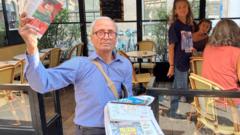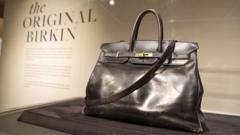Ali Akbar, known as France's last newspaper hawker, reflects on his unique journey and the evolving landscape of journalism in a digital age.
Ali Akbar: The Last Newspaper Hawker in France Honored by Macron

Ali Akbar: The Last Newspaper Hawker in France Honored by Macron
The iconic Left Bank seller receives the Order of Merit for his cultural contributions.
Ali Akbar, at the age of 72, stands as a nostalgic emblem on Paris's renowned Left Bank, having dedicated over five decades to selling newspapers. Known affectionately as the last newspaper hawker in France, and perhaps all of Europe, Akbar is set to be honored by President Emmanuel Macron with the prestigious Order of Merit, a recognition of his significant contributions to French cultural history.
"When I started out in 1973, there were 35 or 40 sellers like me in Paris; now I'm the only one left," Akbar reminisces, indicating the stark decline of his profession due to the rise of digital media. "People now prefer to check their phones for news," he laments. Nowadays, during his routes through the bustling cafés of artsy Saint-Germain, he typically sells about 30 copies of Le Monde, retaining half the selling price but receiving no refunds for unsold returns. Akbar recalls a time when he would sell up to 80 copies within just the first hour of the newspaper's afternoon release, as crowds eagerly gathered to hear the news.
Despite the shrinking sales, Akbar continues to take joy in his work. "I am a joyous person," he asserts, reveling in the freedom and independence his job brings. Well-known and beloved in his neighborhood, locals affectionately describe him as a brotherly figure, someone who effortlessly connects with the community.
Originally from Rawalpindi, Pakistan, Akbar arrived in Europe in the late 1960s, eventually making his way to Paris after working on a cruise ship. Over the years, he has encountered countless personalities, including Elton John and many up-and-coming politicians, including Macron during their university days.
Reflecting on how the Left Bank has transformed since his arrival, he expresses a bittersweet sentiment about its loss of character. "The place used to be alive with writers, publishers, and artists; now it's more of a tourist destination," he observes. Though he mourns the neighborhood's transformation, his laughter suggests a spirited acceptance of the changing times.
"When I started out in 1973, there were 35 or 40 sellers like me in Paris; now I'm the only one left," Akbar reminisces, indicating the stark decline of his profession due to the rise of digital media. "People now prefer to check their phones for news," he laments. Nowadays, during his routes through the bustling cafés of artsy Saint-Germain, he typically sells about 30 copies of Le Monde, retaining half the selling price but receiving no refunds for unsold returns. Akbar recalls a time when he would sell up to 80 copies within just the first hour of the newspaper's afternoon release, as crowds eagerly gathered to hear the news.
Despite the shrinking sales, Akbar continues to take joy in his work. "I am a joyous person," he asserts, reveling in the freedom and independence his job brings. Well-known and beloved in his neighborhood, locals affectionately describe him as a brotherly figure, someone who effortlessly connects with the community.
Originally from Rawalpindi, Pakistan, Akbar arrived in Europe in the late 1960s, eventually making his way to Paris after working on a cruise ship. Over the years, he has encountered countless personalities, including Elton John and many up-and-coming politicians, including Macron during their university days.
Reflecting on how the Left Bank has transformed since his arrival, he expresses a bittersweet sentiment about its loss of character. "The place used to be alive with writers, publishers, and artists; now it's more of a tourist destination," he observes. Though he mourns the neighborhood's transformation, his laughter suggests a spirited acceptance of the changing times.




















